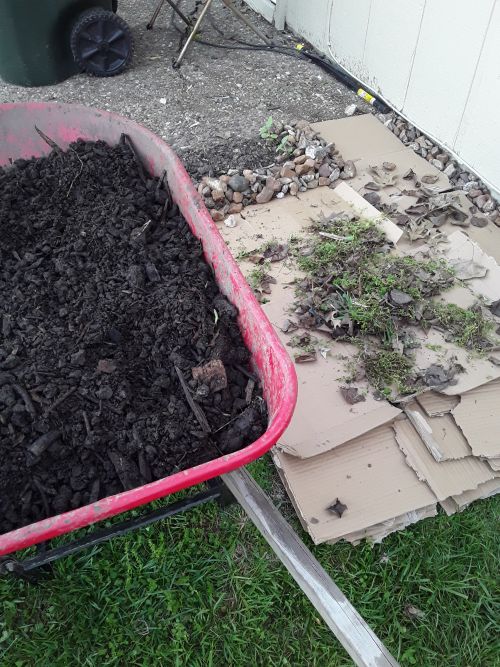Gardening Guides: Difference between revisions
Jump to navigation
Jump to search
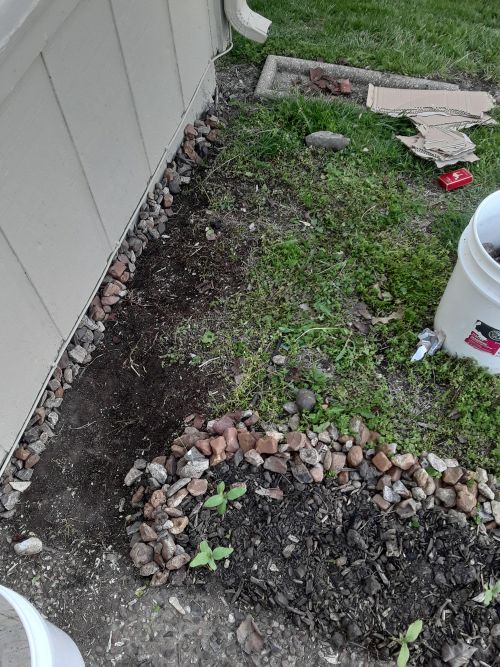
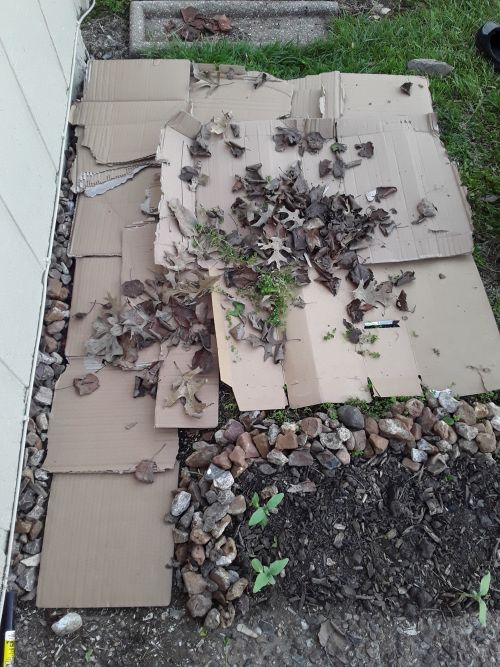
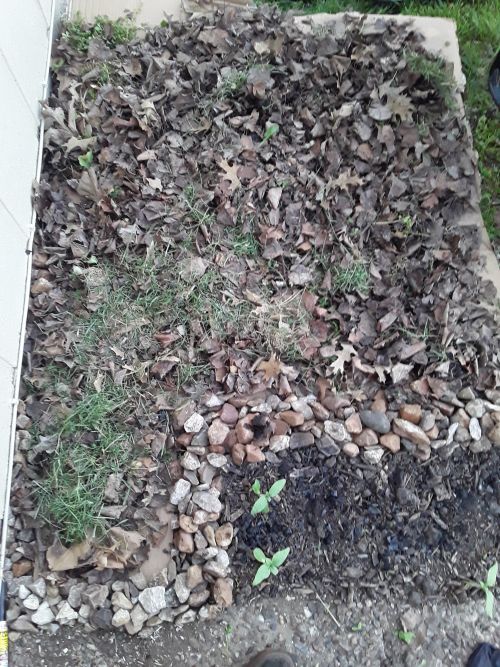
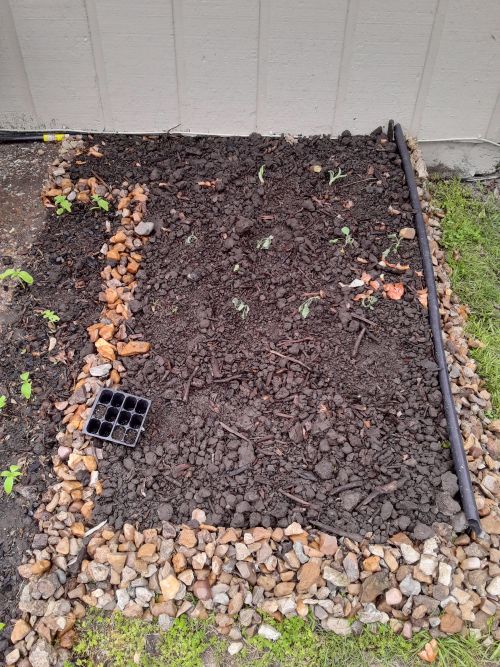
Florez4747 (talk | contribs) |
Florez4747 (talk | contribs) No edit summary |
||
| (6 intermediate revisions by 2 users not shown) | |||
| Line 1: | Line 1: | ||
[[File:GardenBed1.jpg|500px|thumb| | This page is an effort to contribute to [[Food Sovereignty]] | ||
= Small Raised Garden Bed = | |||
[[File:GardenBed1.jpg|500px|thumb|left|'''Step 1:''' Clear the area you plan to use- don’t worry about pulling up grass or any types of small plants growing. You can begin constructing your barrier at this stage- you can see the rock barricade against the house that we have placed ahead of time, and the other barricade that was already in place at the bottom of the photo. We will use these rock barriers to keep the dirt in later.]] | |||
[[File:GardenBed2.jpg|500px|thumb|right|'''Step 2:''' For this step you will need cardboard- the amount will depend on the size of the bed you are trying to make. I just simply rip the pieces up and put the cardboard down like a puzzle piece until the area is covered with the cardboard. If the ground is uneven in the area you’ve chosen, no worries, you can use more cardboard on those areas to build the height of the section to match the surrounding area. The next step will allow you to build up the height of your bed as well. As you can see in the photo, we began to place leaves and grass clippings on top of the cardboard.]] | |||
[[File:GardenBed3.jpg|500px|thumb|left|'''Step 3:''' This step and the following step are basically the same, but I would recommend getting your soil that you’re going to use gathered and positioned next to you, so you can begin piling dirt as soon as you finish creating your garden bed foundation.]] | |||
[[File:GardenBed4.jpg|500px|thumb|right|'''Step 4:''' This step is to help build the soil up, while also leveling out the surface area, and to provide nutrients to the garden bed, as the organic matter decays and turns into soil.<br><br> | |||
We heavily covered our cardboard with lots of leaves (the leaves were at varying stages of decomposition,) grass clippings, and wood ash. For the wood ash I took burnt charred logs from my fire pit and crumbled them up in my hands almost into a powder. The wood ash will provide nutrients while also acting as natural insecticide and pesticide.<br><br> | |||
It’s okay to put larger chunks of wood ash in the pile also, as they will decay and will hold nutrients - slowly releasing nutrients over time during the decay process.]] | |||
[[File:GardenBed5.jpg|500px|thumb|left|'''Step 5:''' The final step is to pile the dirt on top of the cardboard and organic matter. If your barrier is not built yet pile the soil into a big pile- keeping it away from the edges. Before you can spread the soil throughout the bed, I would recommend making a barrier surrounding the bed. We used small rocks that we had a surplus amount of and a piece of plastic which was formerly part of a retaining wall we took down.<br><br> | |||
You can use anything to make the barrier and I recommend getting creative. Some materials I’ve used before are: bricks, logs, thick sticks, and rocks. If you have lumber and tools you can also build a more permanent garden bed structure. There should be plenty of garden bed blueprints online. | |||
Once your retaining wall is built you can spread your soil evenly across the foundation of the bed until you have all of the cardboard, and any other organic matter you chose to put down, covered.<br><br> | |||
You are now ready to begin seeding your garden. Happy Planting!]] | |||
Latest revision as of 04:55, 17 June 2023
This page is an effort to contribute to Food Sovereignty
Small Raised Garden Bed

Step 1: Clear the area you plan to use- don’t worry about pulling up grass or any types of small plants growing. You can begin constructing your barrier at this stage- you can see the rock barricade against the house that we have placed ahead of time, and the other barricade that was already in place at the bottom of the photo. We will use these rock barriers to keep the dirt in later.

Step 2: For this step you will need cardboard- the amount will depend on the size of the bed you are trying to make. I just simply rip the pieces up and put the cardboard down like a puzzle piece until the area is covered with the cardboard. If the ground is uneven in the area you’ve chosen, no worries, you can use more cardboard on those areas to build the height of the section to match the surrounding area. The next step will allow you to build up the height of your bed as well. As you can see in the photo, we began to place leaves and grass clippings on top of the cardboard.

Step 4: This step is to help build the soil up, while also leveling out the surface area, and to provide nutrients to the garden bed, as the organic matter decays and turns into soil.
We heavily covered our cardboard with lots of leaves (the leaves were at varying stages of decomposition,) grass clippings, and wood ash. For the wood ash I took burnt charred logs from my fire pit and crumbled them up in my hands almost into a powder. The wood ash will provide nutrients while also acting as natural insecticide and pesticide.
It’s okay to put larger chunks of wood ash in the pile also, as they will decay and will hold nutrients - slowly releasing nutrients over time during the decay process.
We heavily covered our cardboard with lots of leaves (the leaves were at varying stages of decomposition,) grass clippings, and wood ash. For the wood ash I took burnt charred logs from my fire pit and crumbled them up in my hands almost into a powder. The wood ash will provide nutrients while also acting as natural insecticide and pesticide.
It’s okay to put larger chunks of wood ash in the pile also, as they will decay and will hold nutrients - slowly releasing nutrients over time during the decay process.

Step 5: The final step is to pile the dirt on top of the cardboard and organic matter. If your barrier is not built yet pile the soil into a big pile- keeping it away from the edges. Before you can spread the soil throughout the bed, I would recommend making a barrier surrounding the bed. We used small rocks that we had a surplus amount of and a piece of plastic which was formerly part of a retaining wall we took down.
You can use anything to make the barrier and I recommend getting creative. Some materials I’ve used before are: bricks, logs, thick sticks, and rocks. If you have lumber and tools you can also build a more permanent garden bed structure. There should be plenty of garden bed blueprints online. Once your retaining wall is built you can spread your soil evenly across the foundation of the bed until you have all of the cardboard, and any other organic matter you chose to put down, covered.
You are now ready to begin seeding your garden. Happy Planting!
You can use anything to make the barrier and I recommend getting creative. Some materials I’ve used before are: bricks, logs, thick sticks, and rocks. If you have lumber and tools you can also build a more permanent garden bed structure. There should be plenty of garden bed blueprints online. Once your retaining wall is built you can spread your soil evenly across the foundation of the bed until you have all of the cardboard, and any other organic matter you chose to put down, covered.
You are now ready to begin seeding your garden. Happy Planting!
